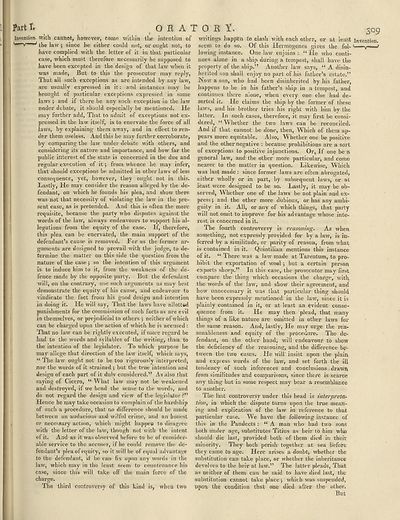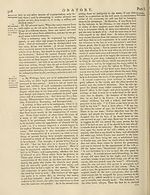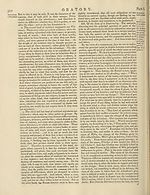Encyclopaedia Britannica > Volume 15, NIC-PAR
(359) Page 309
Download files
Complete book:
Individual page:
Thumbnail gallery: Grid view | List view

Part T.
Invention, with cannot, however, come witliiti tlie intention of
the law ; since he either coulil not, or ought not, to
have complied with the letter of it in that particular
case, which must therefore necessarily be supposed to
have been excepted in the design of that law when it
was made, But to this the prosecutor may reply,
That all such exceptions as are intended by any law,
are usually expressed in it: and instances may be
brought of particular exceptions expressed in some
laws ; and if there be any such exception in the law
i under debate, it should especially be mentioned. He
may further add, That to admit of exceptions not ex¬
pressed in the law itself, is to enervate the force of all
laws, by explaining them away, and in effect to ren¬
der them useless. And this he may further coiToborate,
by comparing the law under debate with others, and
considering its nature and importance, and how far the
public interest of the state is concerned in the due and
regular execution of it; from whence he may infer,
that should exceptions be admitted in other laws of less
consequence, yet, however, they ought not in this.
Lastly, He may consider the reason alleged by the de¬
fendant, on which he founds his plea, and show there
was not that necessity of violating the law in the pre¬
sent case, as is pretended. And this is often the more
requisite, because the party who disputes against the
words of the law, always endeavours to support his al¬
legations from the equity of the case. If, therefore,
this plea can be enervated, the main support of the
defendant’s cause is removed. For as the former ar¬
guments are designed to prevail with the judge, to de¬
termine the matter on this side the question from the
nature of the case; so the intention of this argument
is to induce him to it, from the weakness of the de¬
fence made by the opposite party. But the defendant
will, on the contrary, use such arguments as may best
demonstrate the equity of his cause, and endeavour to
vindicate the fact from his good design and intention
in doing it. He will say, That the laws have allottttd
punishments for the commission of such facts as are evil
in themselves, or prejudicial to others •, neither of which
can be charged upon the action of which he is accused :
That no law can be rightly executed, if more regard be
had to the words and syllables of the writing, than to
the intention of the legislator. To which purpose he
may allege that direction of the law itself, which says,
“ The law ought not to be too rigorously interpreted,
nor the words of it strained ; but the true intention and
design of each part of it duly considered.” As also that
saying of Cicero, “ What law may not be weakened
and destroyed, if wTe bend the sense to the words, and
do not regard the design and view of the legislator ?”
Hence he may take occasion to complain of the hardship
of such a procedure, that no difference should be made
between an audacious and wilful crime, and an honest
or necessary action, which might happen to disagree
with the letter of the law', though not with the intent
of it. And as it was observed before to be of consider¬
able service to the accuser, if he could remove the de¬
fendant’s plea of equity, so it will be of equal advantage
to the defendant, it he can fix upon any words in the
law, which may in the least seem to countenance his
case, since this will take off the main force of the
charge.
The third controversy of this kind is, when two
S09
writings happen to clash with each other, or at least Invention,
seem to do so. Of this Hermogenes gives the fol- l—
lowing instance. One law enjoins : “ He who conti¬
nues alone in a ship during a tempest, shall have the
property of the ship.” Another law says, “ A disin¬
herited sou shall enjoy no part of his father’s estate.”
Now' a son, who had been disinherited by his father,
happens to be in his father’s ship in a tempest, and
continues there alone, when every one else had de¬
serted it. He claims the ship by the former of these
law's, and his brother tries his right with him by the
latter. In such cases, therefore, it may first be consi¬
dered, “Whether the two laws can be reconciled.
And if that cannot be done, then, Which of them aji-
pears more equitable. Also, Whether one be positive
and the other negative : because prohibitions are a sort
of exceptions to positive injunctions. Or, If one be a
general law, and the other more particular, and come
nearer to the matter in question. Likewise, Which
was last made : since former laws are often abrogated,
either wholly or in part, by subsequent laws, or at
least were designed to be so. Lastly, it may be ob¬
served, W bether one of the laws be not plain and ex¬
press j and the other more dubious, or has any ambi¬
guity in it. All, or any of which things, that party
will not omit to improve for his advantage whose inte¬
rest is concerned in it.
The fourth controversy is reasoning. As when
something, not expressly provided for by a law, is in¬
ferred by a similitude, or parity of reason, from what
is contained in it. Quintilian mentions this instance
of it. “ There was a law made at Tarentum, to pro¬
hibit the exportation of wool ; but a certain person
exports sheep.” In this case, the prosecutor may first
compare the thing which occasions the charge, with,
the words of the law, and show their agreement, and
bow unnecessary it was that particular thing should
have been expressly mentioned in the law, since it is
plainly contained in it, or at least an evident conse¬
quence from it. He may then plead, that many
things of a like nature arc omitted in other laws for
the same reason. And, lastly, He may urge the rea¬
sonableness and equity of the procedure. The de¬
fendant, on the other hand, will endeavour to show
the deficiency of the reasoning, and the difference be¬
tween the two cases. He will insist upon the plain
and express words of the law, and set forth the ill
tendency of such inferences and conclusions drawn
from similitudes and comparisons, since there is scarce
any thing but in some respect may bear a resemblance
to another.
The last controversy under this head is interpreta¬
tion, in which the dispute turns upon the true mean¬
ing and explication of the law in reference to that
particular case. We have the following instance of
this in the Pandects : “ A man who had two sons
both under age, substitutes Titius as heir to him who
should die last, provided both of them died in their
minority. They both perish together at sea before
they came to age. Here arises a doubt, whether the
substitution can take place, or whether the inheritance
devolves to the heir at law.” The latter pleads, That
as neither of them can be said to have died last, the
substitution cannot take place j which was suspended,
upon the condition that one died after the other.
But
oratory.
Invention, with cannot, however, come witliiti tlie intention of
the law ; since he either coulil not, or ought not, to
have complied with the letter of it in that particular
case, which must therefore necessarily be supposed to
have been excepted in the design of that law when it
was made, But to this the prosecutor may reply,
That all such exceptions as are intended by any law,
are usually expressed in it: and instances may be
brought of particular exceptions expressed in some
laws ; and if there be any such exception in the law
i under debate, it should especially be mentioned. He
may further add, That to admit of exceptions not ex¬
pressed in the law itself, is to enervate the force of all
laws, by explaining them away, and in effect to ren¬
der them useless. And this he may further coiToborate,
by comparing the law under debate with others, and
considering its nature and importance, and how far the
public interest of the state is concerned in the due and
regular execution of it; from whence he may infer,
that should exceptions be admitted in other laws of less
consequence, yet, however, they ought not in this.
Lastly, He may consider the reason alleged by the de¬
fendant, on which he founds his plea, and show there
was not that necessity of violating the law in the pre¬
sent case, as is pretended. And this is often the more
requisite, because the party who disputes against the
words of the law, always endeavours to support his al¬
legations from the equity of the case. If, therefore,
this plea can be enervated, the main support of the
defendant’s cause is removed. For as the former ar¬
guments are designed to prevail with the judge, to de¬
termine the matter on this side the question from the
nature of the case; so the intention of this argument
is to induce him to it, from the weakness of the de¬
fence made by the opposite party. But the defendant
will, on the contrary, use such arguments as may best
demonstrate the equity of his cause, and endeavour to
vindicate the fact from his good design and intention
in doing it. He will say, That the laws have allottttd
punishments for the commission of such facts as are evil
in themselves, or prejudicial to others •, neither of which
can be charged upon the action of which he is accused :
That no law can be rightly executed, if more regard be
had to the words and syllables of the writing, than to
the intention of the legislator. To which purpose he
may allege that direction of the law itself, which says,
“ The law ought not to be too rigorously interpreted,
nor the words of it strained ; but the true intention and
design of each part of it duly considered.” As also that
saying of Cicero, “ What law may not be weakened
and destroyed, if wTe bend the sense to the words, and
do not regard the design and view of the legislator ?”
Hence he may take occasion to complain of the hardship
of such a procedure, that no difference should be made
between an audacious and wilful crime, and an honest
or necessary action, which might happen to disagree
with the letter of the law', though not with the intent
of it. And as it was observed before to be of consider¬
able service to the accuser, if he could remove the de¬
fendant’s plea of equity, so it will be of equal advantage
to the defendant, it he can fix upon any words in the
law, which may in the least seem to countenance his
case, since this will take off the main force of the
charge.
The third controversy of this kind is, when two
S09
writings happen to clash with each other, or at least Invention,
seem to do so. Of this Hermogenes gives the fol- l—
lowing instance. One law enjoins : “ He who conti¬
nues alone in a ship during a tempest, shall have the
property of the ship.” Another law says, “ A disin¬
herited sou shall enjoy no part of his father’s estate.”
Now' a son, who had been disinherited by his father,
happens to be in his father’s ship in a tempest, and
continues there alone, when every one else had de¬
serted it. He claims the ship by the former of these
law's, and his brother tries his right with him by the
latter. In such cases, therefore, it may first be consi¬
dered, “Whether the two laws can be reconciled.
And if that cannot be done, then, Which of them aji-
pears more equitable. Also, Whether one be positive
and the other negative : because prohibitions are a sort
of exceptions to positive injunctions. Or, If one be a
general law, and the other more particular, and come
nearer to the matter in question. Likewise, Which
was last made : since former laws are often abrogated,
either wholly or in part, by subsequent laws, or at
least were designed to be so. Lastly, it may be ob¬
served, W bether one of the laws be not plain and ex¬
press j and the other more dubious, or has any ambi¬
guity in it. All, or any of which things, that party
will not omit to improve for his advantage whose inte¬
rest is concerned in it.
The fourth controversy is reasoning. As when
something, not expressly provided for by a law, is in¬
ferred by a similitude, or parity of reason, from what
is contained in it. Quintilian mentions this instance
of it. “ There was a law made at Tarentum, to pro¬
hibit the exportation of wool ; but a certain person
exports sheep.” In this case, the prosecutor may first
compare the thing which occasions the charge, with,
the words of the law, and show their agreement, and
bow unnecessary it was that particular thing should
have been expressly mentioned in the law, since it is
plainly contained in it, or at least an evident conse¬
quence from it. He may then plead, that many
things of a like nature arc omitted in other laws for
the same reason. And, lastly, He may urge the rea¬
sonableness and equity of the procedure. The de¬
fendant, on the other hand, will endeavour to show
the deficiency of the reasoning, and the difference be¬
tween the two cases. He will insist upon the plain
and express words of the law, and set forth the ill
tendency of such inferences and conclusions drawn
from similitudes and comparisons, since there is scarce
any thing but in some respect may bear a resemblance
to another.
The last controversy under this head is interpreta¬
tion, in which the dispute turns upon the true mean¬
ing and explication of the law in reference to that
particular case. We have the following instance of
this in the Pandects : “ A man who had two sons
both under age, substitutes Titius as heir to him who
should die last, provided both of them died in their
minority. They both perish together at sea before
they came to age. Here arises a doubt, whether the
substitution can take place, or whether the inheritance
devolves to the heir at law.” The latter pleads, That
as neither of them can be said to have died last, the
substitution cannot take place j which was suspended,
upon the condition that one died after the other.
But
oratory.
Set display mode to:
![]() Universal Viewer |
Universal Viewer | ![]() Mirador |
Large image | Transcription
Mirador |
Large image | Transcription
Images and transcriptions on this page, including medium image downloads, may be used under the Creative Commons Attribution 4.0 International Licence unless otherwise stated. ![]()
| Encyclopaedia Britannica > Encyclopaedia Britannica > Volume 15, NIC-PAR > (359) Page 309 |
|---|
| Permanent URL | https://digital.nls.uk/192586365 |
|---|
| Attribution and copyright: |
|
|---|
| Shelfmark | EB.11 |
|---|---|
| Description | Ten editions of 'Encyclopaedia Britannica', issued from 1768-1903, in 231 volumes. Originally issued in 100 weekly parts (3 volumes) between 1768 and 1771 by publishers: Colin Macfarquhar and Andrew Bell (Edinburgh); editor: William Smellie: engraver: Andrew Bell. Expanded editions in the 19th century featured more volumes and contributions from leading experts in their fields. Managed and published in Edinburgh up to the 9th edition (25 volumes, from 1875-1889); the 10th edition (1902-1903) re-issued the 9th edition, with 11 supplementary volumes. |
|---|---|
| Additional NLS resources: |
|

